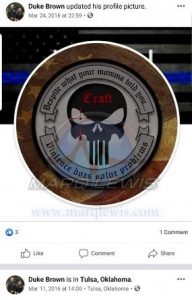 This Thursday (September 26, 2024), AFLC Co-Founder and Senior Counsel Robert Muise will be arguing before the U.S. Court of Appeals for the Tenth Circuit at a special session to be held at the University of Colorado Law School in Boulder.
This Thursday (September 26, 2024), AFLC Co-Founder and Senior Counsel Robert Muise will be arguing before the U.S. Court of Appeals for the Tenth Circuit at a special session to be held at the University of Colorado Law School in Boulder.
Muise will be arguing an important First Amendment case, which is likely why this case was selected for the special law school session.
On September 4, 2019, the City of Tulsa, Oklahoma, through its Chief of Police, fired our client, Officer Wayne Brown, because local political activists complained to the City about conservative social media posts Brown had made several years prior to his hiring as a Tulsa police officer.
The “offending” posts included the following:



Not surprising, the rank-and-file officers thought the firing was “B.S.,” which it was, in addition to violating the First Amendment, but the woke leadership preferred to violate the U.S. Constitution and appease the Black Lives Matter anti-police movement as well as the Council on American-Islamic Relations (CAIR), a Muslim Brotherhood front group operating in the United States, who were behind the bogus complaints of “racism” and “Islamophobia” attributed to the posts.
As we set forth in our briefing filed in the Tenth Circuit, it is well settled that the government cannot condition public employment on a basis that infringes the employee’s constitutionally protected interest in freedom of expression.
Brown’s speech caused no internal disruption whatsoever. In fact, his firing (not his speech) caused internal strife. And it is unlawful as a matter of Tenth Circuit precedent to fire a government employee based on the reaction that outsiders might have to his speech. This is known as a “heckler’s veto”—which is impermissible under the First Amendment.
As the record shows, in response to a media inquiry, the Tulsa Police Department’s Public Information Officer, wrote:
“Early yesterday morning the police department was notified of some questionable social media posts by one of our officers. The Chief immediately ordered internal affairs to open an investigation, and within one hour and 15 minutes of receiving the complaint the officer was terminated.”
This is not disruption in the workplace; it is the cancel culture at work to suppress speech.
As we argued in our briefs filed in the Tenth Circuit:
“The policy implications associated with permitting the government to terminate a public employee for speech on social media that he made several years prior to his hiring are grave. Permitting such actions threatens to chill the free speech rights of anyone who has an interest in pursuing public employment in the future.”
Please keep this important case in your prayers. And please consider contributing to this officer’s defense as we are representing him pro bono. Your donation is tax deductible to the fullest extent of the law as AFLC is recognized by the IRS as a 501(c)(3) organization.

